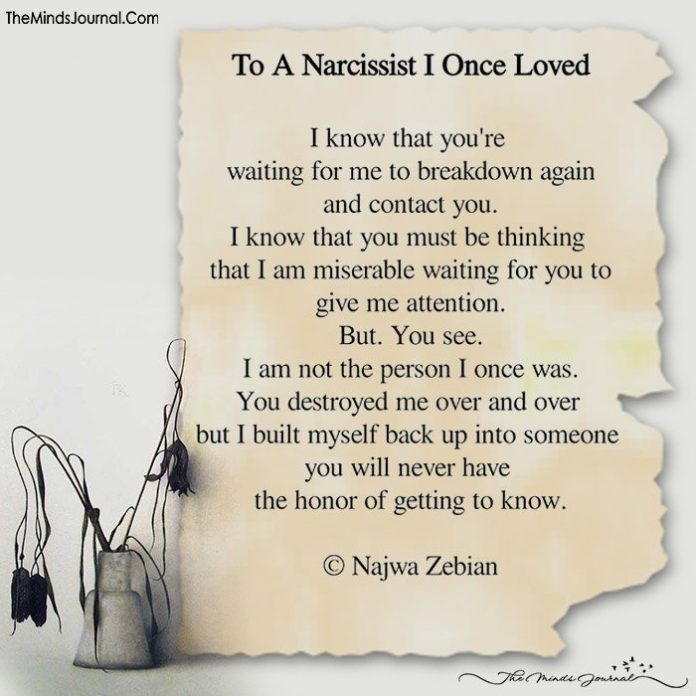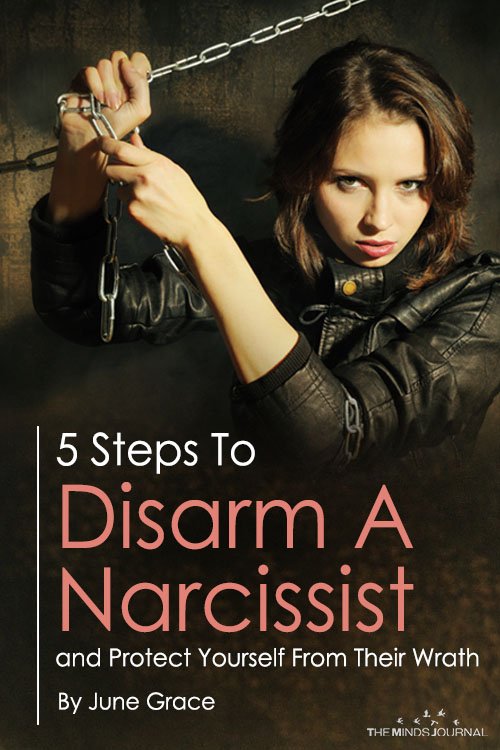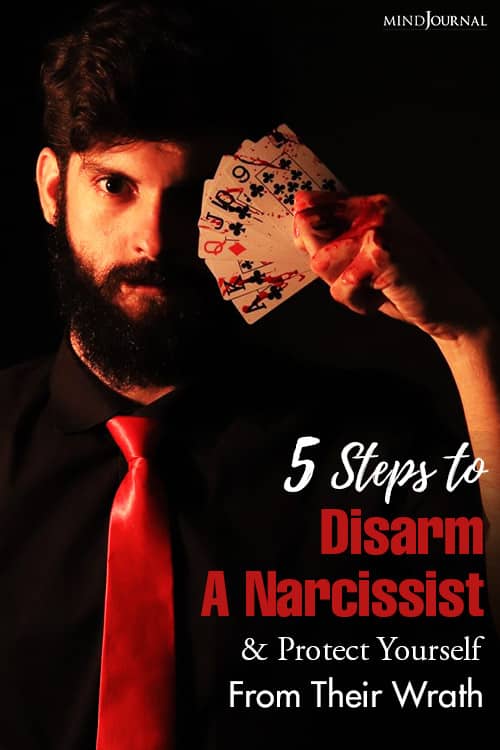You can’t change a narcissist, but you can learn how to disarm them and protect yourself from the havoc they wreak on your life. Once you have the tools and knowledge to disarm a narcissist, you will slowly become immune to their manipulations and toxicity.
I didn’t realize I was married to a narcissist until I divorced one.
I never connected the dots between my husband’s manipulative and emotionally avoidant behavior, lack of empathy, and his inability to compromise or put anyone before himself, even his own family. I felt there had to be a pathological explanation for his behavior, but I didn’t know what. And despite my best attempts, I couldn’t pinpoint an effective way to sustain our relationship.
Then he walked out the door, which was a blessing in the end.
According to the American Psychological Association, narcissism is a personality disorder that causes people to have a delusional sense of self-worth and lack of empathy. Narcissists are incapable of regulating their emotions and considering the impact their actions have on others.
But clarity is powerful because it’s your best defense against a bully. And make no mistake about it, narcissists are bullies.
“The tough thing about a relationship with a narcissist is that they often run on hope,” says psychologist Ramani Durvasula, Ph.D. in her interview, Speaking of Psychology: Recognizing a Narcissist.
Unless your narcissistic partner is willing to do a lot of work in therapy, life is never going to get better and you will suffer. Co-parenting with a narcissistic ex is complicated at best, enraging at worst. The problems you experienced in your marriage don’t disappear after a divorce, just as personality disorders don’t fall to the wayside when you’re in the midst of a custody battle.
My husband used to give me the silent treatment when he didn’t get his way. He’d declare himself right and simply move into the guest room until I changed my mind. It brought me to tears every time. There was no empathy, reasoning, or compromise from him.
I shouldn’t have expected any empathy from him during our divorce either, but I did because it’s just the way my brain is wired, like most people, to think about what’s fair. So when it comes to my ex, I had to rewire.
Related: 4 Techniques To Control and Disarm a Manipulator
Narcissists don’t do partnerships. The more you give, the more they want, until you can’t give anymore and are wrecked, and then they walk out the door, looking for their next victim. It’s called narcissistic supply. They need it. You have it. Your job is to provide it until they are happy.
People with narcissistic tendencies can be so damn charming. It makes you doubt yourself as hope flashes by. It will pass, though… it always does.
There is a reason why flight attendants remind passengers to “secure their own oxygen mask first, before helping others.” Because for most people, our instinct is to reach out and help our loved ones first. As parents, we have to fight our instinct to put our child’s safety before our own. We operate on auto-pilot by ensuring our offspring’s safety. That’s why we need a reminder: put your own mask on first.
A narcissist on an airplane? He doesn’t need a reminder. He’s probably thinking, why would anyone need a reminder to save yourself first? And yes, this includes their own children. It’s not that narcissists don’t love their children, it’s that their brains are literally not capable of putting anyone, their children included, before themselves.
As sad as it sounds, narcissists often see their children not as separate beings, but as an extension of themselves. What does that mean? That a narcissistic parent is likely to feel whatever makes them happy will also make their child happy, like it will rub off on them, as opposed to a parent considering what their child’s needs are first, then thinking about how to structure their own needs around that.
To disarm a narcissist, you have to be more prepared than he (or she) is. So expect the charm, you know it won’t last, and follow these five steps to protect yourself from their wrath.
Here Are 5 Steps To Disarm A Narcissist and Protect Yourself From Their Wrath
Step 1: Disengage.
Don’t be taken aback by the narcissist’s angry indignation. Don’t engage with him about it, don’t try to reason. Only consider what you yourself can control and do that, every time.
The only way a narcissist comprehends that he has done something wrong is when you refuse to accept it. It can feel like you are treading water as he shifts from his charming self to snake to get whatever he’s after, but if you know it’s wrong, don’t fall for it. Take a pause every chance you get to buy yourself time to think. Do not engage. Do not take the bait.

Step 2: Boundaries.
In my situation, my ex-husband didn’t understand boundaries until the police showed up on his doorstep. So yes, set boundaries, whatever yours are, clearly communicate them to the narcissist in writing and keep a copy posted on your wall for yourself.
When (not if) he crosses those boundaries, immediately send a warning, in writing, and outline your next steps should the boundary continue to be crossed. The next time he crosses it, send no warning and execute the steps you outlined.
Never suggest something you are not actually willing to do. This is another key aspect of what differentiates a person with a narcissistic personality disorder: they will bluff and bluff until their house of cards falls down. Your strength is in your adherence to the boundaries you set and in the swiftness of your actions, not against the narcissist, but to protect yourself from the narcissist.
Related: 10 Tips That Will Help You Avoid Emotional Manipulation
Step 3: Eliminate “fair” and “I’m sorry” from your vocabulary.
Life is not fair, so we have been told. I struggle to maintain my composure with this one, but in the eyes of a narcissist, fair isn’t a real concept. “Fair” means getting what they want. That’s fair. Anything else is unfair and thrown back on you. It’s not rational, so don’t even try to make sense of it from your own perspective and instead accept that it sucks.
Stop apologizing. Here’s why: what a narcissist hears when you apologize is that you are wrong and he is perfect. Do not apologize to a narcissist in an attempt to reason or get on the same page. It will backfire.
Step 4: Accept it.
By acceptance, I do not mean accepting the narcissist’s bullshit, but the sooner you accept that you cannot change someone with this type of personality disorder, the easier it will be for you. And whatever you do, don’t try to win at their game or outsmart them — you will only fuel the fire. They are stuck living with themselves and their imperfections forever. Lucky you.
When you have to maintain a relationship after divorce, when you’re forced to communicate together and co-parent children together, it can be easy to fall into old patterns of behavior, enabling, making excuses for, and bending just to reach a compromise. But if you do that, it will never end.
The only way to deal with this bully is to know what you need to accomplish before going in and not wavering based on their whims, lies, and attempts at manipulation. You have to work with this person despite their short-comings, but it does not mean you have to circumvent your own needs or boundaries to achieve it.
Easier said than done. I get it — I live it.
Step 5: Learn how to move on.
The behavior we refuse to accept, by its very nature, should be quicker to extinguish than behavior we intermittently reinforce or allow. In other words, if you want the narcissist’s behavior to stop, you must figure out in advance what you will accept and what you won’t. Then respond (or not respond) the same way every single time, until he gets so bored with you that he moves on.
Related: 15 Signs He Is Manipulating You and Not Just Being Possessive
You can’t change a narcissist. All you can do is protect yourself from the havoc they will wreak on your life.
If, like me, you are already married, divorced, or had children with one, then you have to take steps to disarm him before his behavior completely ruins your life.
Written by June Grace
Printed with Permission
You may also like











Leave a Reply